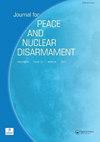The Security of Nuclear Weapon-Free Zones: The Middle East as a Test Case for Unconditional Security Assurances
IF 1.4
Q4 INTERNATIONAL RELATIONS
引用次数: 0
Abstract
ABSTRACT A just nuclear order based on voluntary abstinence by states and the promotion of nuclear weapon-free zones would require more credible negative security assurances than provided by the current non-proliferation regime. The question here is: how to create the necessary conditions for such a change? The negative security assurances issued to the non-nuclear states in general and to the existing regional nuclear weapon-free zones in particular are reviewed. These are analysed in relation to their conditionality and ambiguity in order to understand the security provided. On this basis, possible options to achieve unconditional, legally based security assurances collectively for all the zone states are presented. These assurances could potentially be a tool to increase the number of non-nuclear states and nuclear weapon-free zones, especially in cases where there are one or several nuclear weapon states. Currently, the most acute example is the one in the Middle East. The lack of progress in this case will haunt the NPT review conferences and deepen the crisis until some positive steps take place. In case unconditional, legal security assurances are agreed to, these could provide an interim first phase for the WMD-free zone in the Middle East and allow for some of the disagreements among the participants to at least be discussed. The model here would be the transformation of the hostile relations between Brazil and Argentina initiated by the Treaty of Tlatelolco.无核武器区的安全:中东作为无条件安全保证的试验案例
摘要建立在各国自愿禁欲和促进无核武器区基础上的公正核秩序,需要比现行不扩散制度提供更可信的消极安全保证。这里的问题是:如何为这种变化创造必要的条件?审查了对一般无核国家,特别是对现有区域无核武器区作出的消极安全保证。为了理解所提供的担保,对这些担保的条件和模糊性进行了分析。在此基础上,提出了为所有区域国家集体实现无条件、基于法律的安全保证的可能选择。这些保证可能成为增加无核国家和无核武器区数量的工具,特别是在有一个或几个核武器国家的情况下。目前,最突出的例子是中东的例子。在这种情况下缺乏进展将困扰《不扩散条约》审议大会,并加深危机,直到采取一些积极步骤。如果同意无条件的法律安全保证,这些保证可以为中东无大规模毁灭性武器区提供临时的第一阶段,并允许至少讨论参与者之间的一些分歧。这里的模式将是《特拉特洛尔科条约》所倡导的巴西和阿根廷之间敌对关系的转变。
本文章由计算机程序翻译,如有差异,请以英文原文为准。
求助全文
约1分钟内获得全文
求助全文
来源期刊

Journal for Peace and Nuclear Disarmament
INTERNATIONAL RELATIONS-
CiteScore
1.30
自引率
0.00%
发文量
36
审稿时长
12 weeks
 求助内容:
求助内容: 应助结果提醒方式:
应助结果提醒方式:


